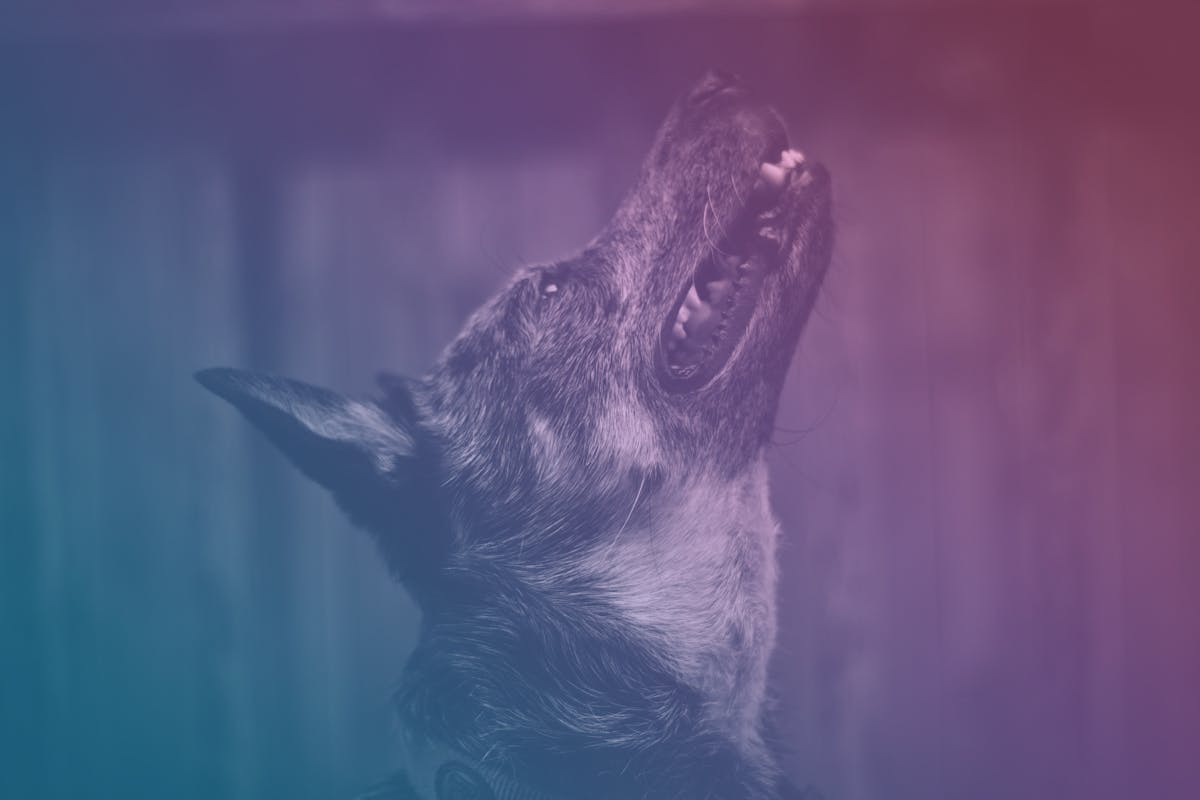Pain, separation anxiety and stress are some of the reasons why dogs cry and howl at night. Dogs have a unique way of communicating with the world around them, and their vocalizations—crying, whimpering, or howling—are no exception.
For many pet owners, a dog crying or howling in the still of night can be unnerving, frustrating, and confusing. Is your dog in pain, scared, or simply seeking attention?
Understanding why dogs exhibit this nighttime behavior is key to addressing their needs and improving their quality of life.
In this comprehensive guide, we’ll explore the root causes of why dogs cry and howl at night, debunk cultural myths, and provide actionable solutions to help you and your furry companion enjoy peaceful nights.
Table of Contents
ToggleThe Nature of Crying and Howling in Dogs
Dogs communicate in numerous ways, and vocalization is one of their most primal tools. Crying and howling are inherited traits from their wild ancestors—wolves. These sounds serve various purposes, including calling for help, expressing distress, or even marking their presence.
- Crying: Soft whimpering or crying typically signals discomfort, loneliness, or a need for attention.
- Howling: A louder, more prolonged sound often associated with a desire to communicate over distances, respond to environmental triggers, or alert their pack.
Understanding the difference between these sounds can help pet owners pinpoint their dog’s emotional or physical state.
Common Reasons Why Dogs Cry at Night
If your dog cries at night, there’s usually an underlying cause. Some of the most common explanations include:
a) Loneliness or Separation Anxiety
Dogs are pack animals by nature. Being left alone for extended periods, particularly at night, can trigger feelings of isolation and fear. Puppies and newly adopted dogs are especially prone to this.
Signs: Whining, pacing, scratching doors, or crying when you leave the room.
Solution:
- Place a blanket or toy with your scent near their sleeping area.
- Gradually increase time alone to build confidence.
b) Physical Discomfort or Pain
A dog in physical distress may cry or whimper as a plea for help. This could be caused by:
- Injuries
- Digestive issues (e.g., bloating or parasites)
- Joint pain (common in older dogs)
Solution:
If crying persists, consult a veterinarian to identify and treat potential medical issues.
c) Hunger or Thirst
Dogs may cry if their basic needs haven’t been met, such as food or water. Puppies, in particular, require frequent feeding and hydration.
Solution:
- Stick to a consistent feeding schedule.
- Ensure fresh water is always accessible.
d) Environmental Stress
Loud noises like fireworks, thunderstorms, or traffic can easily disturb dogs at night, leading to cries of fear or stress.
Solution:
- Provide a quiet, comfortable space for your dog to sleep.
- Use calming music or white noise to mask external sounds.
Why Do Dogs Howl? Instinct and Modern Triggers
Howling is an instinctive behavior that harks back to the days when dogs’ ancestors—wolves—used it to communicate across vast distances. Today, howling persists for a variety of reasons:
a) Responding to Sounds
Certain sounds, like sirens, alarms, or other dogs howling, can trigger an instinctive response. Dogs perceive these sounds as signals, prompting them to join in.
b) Seeking Attention
Howling can be a form of attention-seeking behavior. If a dog notices that howling brings their owner into the room or results in extra care, they may repeat it.
Solution: Avoid reinforcing howling by rewarding it with attention. Instead, address the root cause.
c) Territorial Communication
In multi-dog households, howling can serve as a territorial display or a way of asserting dominance.
Solution: Provide individual sleeping spaces and address any underlying competition or anxiety.
Puppies Crying at Night: Special Considerations
Puppies are particularly prone to nighttime crying. Removed from their littermates and mother, they feel vulnerable and scared in their new environment.
Why Do Puppies Cry at Night?
- Loneliness
- Hunger or thirst
- Unfamiliar surroundings
- Incomplete house training
Solutions for Puppies:
- Comfort: Use a warm blanket or soft toy to mimic the feeling of their mother’s presence.
- Crate Training: Introduce crate training gradually to give them a secure sleeping space.
- Consistency: Establish a bedtime routine to help them adjust faster.
Nighttime Health Issues That Cause Crying
If your dog’s nighttime vocalizations are unusual or sudden, health concerns may be at play.
Common Medical Causes
- Arthritis or Joint Pain: Senior dogs may struggle with pain, especially in cold weather.
- Digestive Problems: Parasites, indigestion, or bloating can lead to discomfort.
- Cognitive Dysfunction: Older dogs with canine dementia often experience confusion, particularly at night.
Solution:
Watch for signs such as lethargy, limping, loss of appetite, or excessive pacing. Schedule a vet appointment for a thorough checkup.
Environmental Triggers: Noise, Light, and Discomfort
Dogs are highly sensitive to their surroundings. Certain environmental factors can disrupt their sleep:
- Noisy Environments: Sirens, construction, or traffic noises can disturb dogs.
- Temperature Fluctuations: Extreme cold or heat can cause discomfort.
- Unfamiliar Scents: New pets, visitors, or even pests can make dogs uneasy.
Solutions:
- Create a dedicated, quiet sleeping area.
- Use blackout curtains to block out light and reduce distractions.
- Provide cozy bedding appropriate for the season.
Superstitions and Myths About Dogs Howling at Night
Throughout history, howling dogs have been shrouded in superstition. In some cultures, it’s believed that a dog howling signifies bad omens, such as impending death or misfortune.
Fact Check: Dogs howl at night due to instinct or external triggers, not mystical causes. Modern science proves that canine vocalizations are a natural part of their communication.
How to Stop Dogs from Crying and Howling at Night
If your dog’s vocalizations are disrupting the household, consider these solutions:
- Physical Exercise: A tired dog is a quiet dog. Regular walks and playtime reduce nighttime restlessness.
- Mental Stimulation: Provide puzzle toys or training exercises to keep their mind engaged.
- Comfortable Sleeping Area: Ensure they have a warm, quiet, and safe space to sleep.
- Establish a Routine: Consistent meal times, bathroom breaks, and bedtime help reduce anxiety.
When to Seek Professional Help
If your dog’s crying or howling persists despite your efforts, it may indicate a deeper issue. Seek veterinary advice if:
- Crying is accompanied by limping, vomiting, or other physical symptoms.
- There’s a sudden change in behavior or temperament.
- Excessive vocalizations occur without a clear cause.
A professional can rule out medical issues and recommend behavioral training if needed.
Conclusion
Dogs rely on their owners for comfort, safety, and companionship. Understanding why they cry or howl at night helps you meet their needs more effectively. Whether it’s addressing anxiety, providing proper care, or simply being there for them, your response makes all the difference.
By creating a nurturing environment and identifying the root cause of their behavior, you can transform restless nights into peaceful ones—for both you and your beloved companion. If all else fails, don’t hesitate to seek help from professionals who can provide the best path forward.
Call to Action:
If your dog’s nighttime behavior leaves you puzzled, share your experiences or consult with a trusted veterinarian to uncover the truth behind their cries. Together, let’s ensure your furry friend sleeps soundly and happily!






